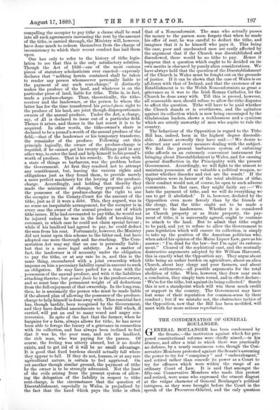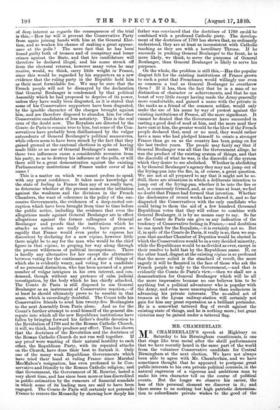THE CONDEMNATION OF GENERAL BOULANGER. G ENERAL BOULANGER has been condemned
by the Senate,—the institution against which his pro- posed constitutional reforms were chiefly aimed,—in his absence, and after a trial in which there was practically no defence, by a nearly unanimous vote, though the Con- servative Members protested against the Senate's assuming the power to try for " conspiracy " and " embezzlement," and retired rather than concede its power as a Court to try for offences which were within the range of an ordinary Court of Law. It is said that amongst the fifty-one Conservative Members who made this protest and retired, were some who expressed the utmost disgust at the vulgar character of General Boulanger's political intrigues, as they were brought before the Court in the speech of the Procureur-Glin6rel, and the only question of deep interest as regards the consequences of the trial is this,—How far will it prevent the Conservative Party from again joining hands with him at the General Elec- tion, and so weaken his chance of making a great appear- ance at the polls ? The mere fact that he has been' found guilty both of treason and of conspiracy and lesser crimes against the State, and that his candidature will therefore be declared illegal, and his name struck off from the electoral returns, however many votes he may receive, would, we think, carry little weight in' France, since this would be regarded by his supporters as a new evidence that the ruling party in the Republic hold him as their most formidable foe. We may be sure that the French people will not be dismayed by the declaration that General Boulanger is condemned by that political Assembly which he had proposed to deprive of its power, unless they have really been disgusted, as it is stated that some of his Conservative supporters have been disgusted, by the ignoble character of the charges brought against him, and are therefore disposed to abandon him for other Conservative candidates of less notoriety. This is the real crux of the doubt now. The Royalists are directed by the Comte de Paris to remain true to him, but some of the Con- servatives have probably been disillusioned by the vulgar antecedents of General Boulanger's political manoeuvres, while others seem to have been struck by the fact that they gained ground at the cantonal elections in spite of having made little or no use of General Boulanger's name. Will these two influences cause a considerable secession from his party, so as to destroy his influence at the polls, or will there still be a great demonstration against the existing Parliamentary institutions of France under cover of his name ?
This is a matter on which we cannot profess to speak with any great confidence. It takes more knowledge of the state of feeling in France than any of us really have, to determine whether at the present moment the irritation against the weakness and the divisions in the French Chambers, the want of coherence in the policy of the suc- cessive Governments, the evidences of a deep-rooted cor- ruption which have been brought from time to time before the public notice, including the evidence that even the allegations made against General Boulanger are in effect allegations against the former colleagues of General Boulanger and proofs that the institutions which he attacks as rotten are really rotten, have grown so rapidly that France would even prefer to express her discontent by declaring for a new regime, however little there might be to say for the man who would be the chief figure in that regime, to groping her way along through the present wilderness of political incompetence. There is hardly any alternative for her except the alternative between voting for the continuance of a state of things of which she is evidently weary, and voting for a candidate of no personal distinction, who has been accused of a great number of vulgar intrigues in his own interest, and con- demned, though without any pretence of calm judicial investigation, by the body which he has chiefly attacked. The Comte de Paris is still disposed to use General Boulanger as an instrument of Conservative reaction,—if at least he should ultimately prove to be useable in that sense, which is exceedingly doubtful. The Count tells his Conservative friends to send him twenty-five Boulangists to the next Assembly from Paris alone. And as for the Count's further attempt to avail himself of the general dis- repute into which all the new Republican institutions have fallen by bringing forward. his father's double devotion to the Revolution of 1789 and to the Roman Catholic Church, it will, we think, hardly produce any effect. Time has shown that the doctrines of the Revolution and the doctrines of the Roman Catholic Church do not run well together. If any proof were wanting of their natural hostility to each other, the Republican Party, with its repeated attacks on the Church, have done their best to furnish it. Only one of the many weak Republican Governments which have tried their hand at ruling France since Marshal MacMahon's resignation, has even professed to be Con- servative and friendly to the Roman Catholic religion; and that Government, the Government of M. Rouvier, lasted a very short time, and has since been more or less discredited in public estimation by the rumours of financial scandals in which some of its leading men are said to have been engaged. The Comte de Paris will certainly not persuade France to restore the Monarchy by showing how deeply his father was convinced that the doctrines of 1789 could be combined with a profound Catholic piety. The develop- ment of the doctrines of 1789 has shown that, as ordinarily understood, they are at least as inconsistent with Catholic teaching as they are with a hereditary Throne. If he succeeds in pushing General Boulanger to the front, he is more likely, we think, to serve the purposes of General Boulanger, than General Boulanger is likely to serve his purposes.
On the whole, the problem is still this,—Has the popular disgust felt for the existing institutions of France grown to such a point that Frenchmen would willingly use even so common a tool as General Boulanger to overthrow them ? If it has, then the fact that he is a man of no distinction of character or achievements, and that he can boast of very little except having made the Army generally more comfortable, and gained a name with the private in the ranks as a friend of the common soldier, would. only make the use of his name by way of protest against the existing institutions of France, all the more significant. It cannot be denied that the Government have succeeded in casting a good deal of mud at him, and the more mud they have cast at him, the greater would be the blow if the French people declared that, mud or no mud, they would rather have a man who had pledged himself to create a stronger France than go on as the country has been going on for the last twelve years. The people may fairly say that if General Boulanger was all that the Government allege, he was the product of the existing system of things, and that the discredit of what he was, is the discredit of the system which they desire to see abolished. Whether in abolishing it by General Boulanger's agency they may not jump out of the frying-pan into the fire, is, of course, a great question. We are not at all prepared to say that it mightnot be so. Still, there are situations in which a deliberate intention to jump out of the frying-pan, whether it be into the fire or not, is consciously formed, and, at one time at least, we feel no doubt that France had• formed that intention. Whether the disclosures of recent weeks have altered it, and so far disgusted the Conservatives with the only candidate who could bring to them the aid of a few hundred .thousand Republican votes that they will refuse to combine with General Boulanger, it is by no means easy to say. So far as the Comte de Paris can give us any indication of the tendency of Conservative feeling in France,—and doubtless he can speak for the Royalists,—it is certainly not so. But if, in spite of the Comte de Paris, it really is so, then we sup- pose that another Chamber of Deputies would be elected in which the Conservatives would be in a very decided minority, while the Republicans would be as divided as ever, except in their resolve to hold fast by the Republican name. If, on the other hand, disgust at the existing regime is so profound that the more soiled. is the standard of revolt, the more eagerly it will be flaunted. in the face of those who ask the French people to rally to the Government, —and that is evidently the Comte de Paris's view,—then we shall see a demonstration for General Boulanger which will be all the more impressive because no one believes him to be anything but a political adventurer who is popular with the Army, and even more unscrupulous than audacious in advancing his private interests. The so-called act of treason at the Lyons railway-station will certainly not gain for him any great reputation as a brilliant pretender. He is a somewhat tattered flag of revolt against the existing state of things, and he is nothing more ; but great victories may be gained under a tattered flag.



































 Previous page
Previous page